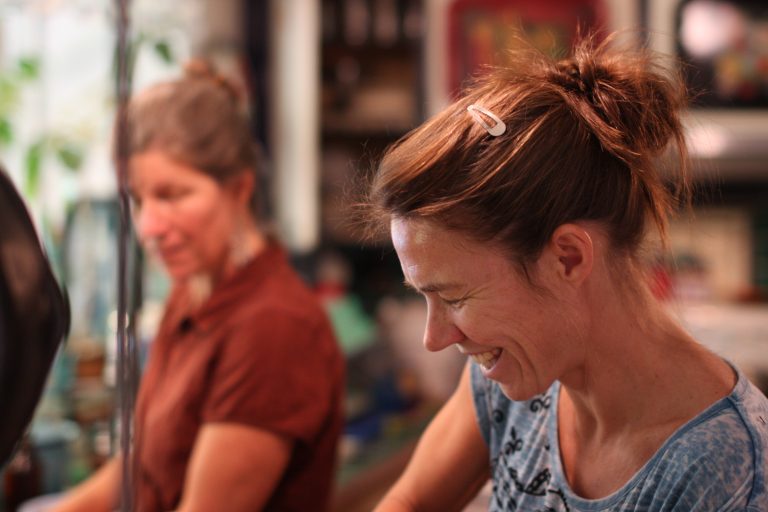
Image by dacky/Flickr, © All Rights Reserved.
So Who Cleans the Kitchen?
I was on a panel last week about how we can create more community living opportunities in urban centers and learned about a fascinating new housing model, pioneered by a group of young entrepreneurs, called StarCity. In their two San Francisco locations (with Oakland to open in January), “members” can rent a fully-furnished bedroom in a building where you share a kitchen and create community through opt-in dinners, volunteer activities, and other group hangs facilitated by the “community manager.”
This new model is supposed to be a solution to a wide variety of urban woes: increasingly unaffordable rents in city centers, the historic preponderance of people living alone, and, most significantly, the rise in isolation and loneliness.
As soon as the Q&A began, I asked Jon Dishotsky, the co-founder of StarCity, the question weighing most heavily on my mind: “So who cleans the kitchen?” The packed crowd laughed and then Dishotsky immediately responded:
“We hire someone. In all of the surveying we’ve done, we’ve found that fights over who cleans the kitchen are among the biggest deterrents to people wanting to live in community.”
Fair enough. I, too, have lived in a dorm room with a particularly notorious whiteboard that was often filled with hastily scrawled comments about the dishes in the sink and the stinking trash. It’s a passive aggressive poetry of sorts that anyone who has ever lived with other human beings knows all too well. To be sure, it would be nice to never see the sexist trope, “your mother doesn’t live here,” ever again.
On the other hand, the tension that underlies these whiteboard screeds, the questions around responsibility and care and community that they represent, are actually far deeper and, dare I argue, emotionally necessary if one is to reap the real benefits of community.
When you are 19 and living in a dorm room, it is one thing to neglect your fellow roommates as you burn the midnight oil hunched over some book in the library or fall madly in love and lose track of time. It’s kind of understandable that you would be a lazy domestic and maybe even a bad community member sometimes. You are young. You are figuring out who you want to be in the world. It’s developmentally appropriate to neglect others in that pursuit, at least to a certain extent.
But when you are a bona fide adult, this kind of neglect — at least if it presents itself habitually — becomes a sign of something else. It becomes a sign that you resisting the knowledge that living interdependently means sometimes doing things that you don’t want to do, things that are hard, things that are messy. And I don’t just mean dishes. I mean the fraught conversations that sometimes precede doing them. I mean having conflict with other living, breathing humans while you are sitting face to face with one another. I mean fighting and making up.
I’ve learned this while living in my own cohousing community. Interestingly, we don’t fight over who cleans the kitchen. We each clean it on the nights when we cook (twice a quarter), and we have hired someone to do a deep clean on the whole common house once a month. That magic recipe was figured out over 17 years of living together. But we do disagree about things from time to time. Sometimes things as big as who God is. Sometimes things as small as how we should dispose of a rotting bookshelf.
We disagree with one another, annoy one another, sometimes even hurt one another, but our relationships are resilient because they’ve grown strong through bending this way and that. It’s the testing of them that makes them so rewarding — the rare but unmistakable presence of friction, not the absence of it, that makes them powerful.
I’ve noticed that my next door neighbor Cheryl uses the word “grace” a lot. I think this is part of what she means. My other neighbor, Kate, refers to living in community as a way to grow up spiritually. It’s not easy, but if it were, it wouldn’t be growth-producing. They are among the co-founders of the community, my friends, my teachers.
Kathryn McCamant, the godmother of cohousing in the United States, also on the panel, expressed that she thought StarCity was a viable stepping stone for people who are wary of living in community. She says that she faces a huge marketing problem when it comes to getting people to really throw their hats in the ring when she’s building cohousing communities. I have deep respect for her hard-earned wisdom. Maybe she’s right. Maybe hiring a cleaning person to make people feel comfortable with the communal experience is a small price to pay toward progress in a world — and a housing market — so totally out of whack.
I can’t help wondering: In our quest to create community, how do we distinguish between the performance versus the real, messy, growth-producing thing? How do we make sure that there is joy and celebration and service, but not at the exclusion of frustration and conflict and catharsis? Or are the latter the inevitable results whenever humans come together, even in places as beautiful and seemingly frictionless as StarCity?
I look forward to watching the development of this new model and finding out.

